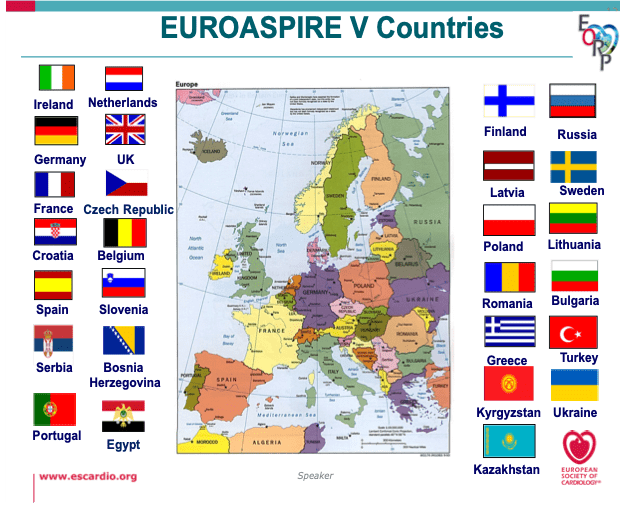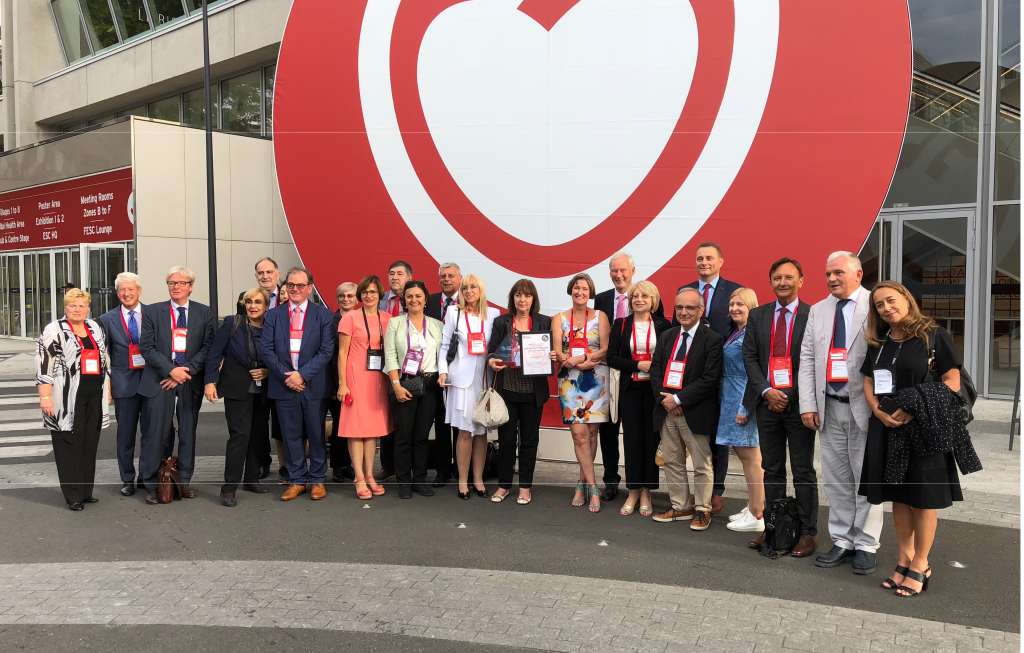EUROASPIRE
Programme of European Surveys of
Secondary and Primary Prevention of Cardiovascular Disease
The European Society of Cardiology (ESC) together with other partner Societies has engaged in a comprehensive programme of CVD prevention in clinical practice since 1994. Guidelines on this important topic have been developed and updated at regular intervals over the last 18 years: 1994, 1998, 2003, 2007, 2012, 2016 and 2021. The aim of the Joint European Societies Guidelines (JES) on cardiovascular disease prevention is to improve the practice of preventive cardiology by encouraging the development of national guidance on cardiovascular disease prevention and its communication, implementation and evaluation through national societies in each country.
Guideline implementation in Europe was evaluated in five cross-sectional surveys with the acronym EUROASPIRE starting in 1995-1996 in nine countries, and this was followed by the second, third, fourth and fifth surveys in 1999-2000 (15 countries), 2006-2007 (22 countries), 2012-2014 (24 countries) and 2016- 2018 (27 countries) through the ESC Euro Heart Survey/EURObservational research programmes.
The objective of each survey was to determine whether clinical practice in patients with coronary heart disease (CHD) and people at high risk of developing CVD was achieving the standards set in the CVD prevention guidelines and whether there were any changes over time in lifestyle, risk factor and therapeutic management. The methodology used in EUROASPIRE I was duplicated in the second, third, fourth and fifth surveys with standardized interviews and measurements, and a central laboratory for lipid and glucose analyses, so that time trends between surveys could be described. Patients were identified from hospital or general practice medical notes and interviewed and examined at least six months but less than two years after the recruiting event. The fourth and fifth European survey of Cardiovascular Disease Prevention and Diabetes merged with the EuroHeart Survey on Diabetes Mellitus and incorporated an assessment of dysglycaemia and renal disease in all patients.
The hospital arm of EUROASPIRE V survey was undertaken at 131 centres in 27 countries. A total of 8,261 patients with coronary disease attended the interview. The results showed that a large majority of patients had unhealthy lifestyles in terms of smoking, diet and sedentary behaviour, which adversely impacts major cardiovascular risk factors. One fifth of patients were current smokers, nearly two-fifths were obese, three-fifths were centrally obese. Forty two per cent had a blood pressure ≥140/90 mm Hg (≥140/85 if diabetes), 71% had LDL-cholesterol ≥1.8 mmol/L (≥70 mg/dL) and 29% reported having diabetes. Cardioprotective medication was: anti-platelets 93%, beta-blockers 81%, ACE inhibitors/ARBs 75% and statins 80%.
The primary care arm of the survey was carried out in 78 centres from 16 European countries. A total of 2,759 patients at high risk of developing CVD attended the interview. The risk factor control was poor with one fifth of patients being smokers, more than two-fifths obese and just under two-thirds centrally obese. Less than half of the patients on blood pressure lowering medication reached the target of <140/90 mmHg (<140/85 mmHg in people with self-reported diabetes). Among treated dyslipidaemic patients less than half attained LDL-cholesterol target of <2.6 mmol/L. Among people treated for type 2 diabetes mellitus, two-thirds achieved the HbA1c target of <7.0%.
The results of the EUROASPIRE V survey clearly demonstrate that most of coronary and high CVD risk patients are failing to achieve the lifestyle, blood pressure, lipid and glycaemic targets as defined in the 2016 JES Guidelines on CVD prevention in clinical practice. A wide gap still exists between the evidence-based guidelines and everyday clinical practice in Europe.

Participating countries:
I. Hospital arm: Belgium, Bosnia & Herzegovina, Bulgaria, Croatia, Czech Republic, Egypt, Finland, Germany, Greece, Ireland, Italy, Kazakhstan, Kyrgyzstan, Latvia, Lithuania, the Netherlands, Poland, Portugal, Romania, Russia, Serbia, Slovenia, Spain, Sweden, Turkey, Ukraine and the United Kingdom.
II. Primary care arm: Bosnia & Herzegovina, Bulgaria, Croatia, the Czech Republic, Egypt, Greece, Kazakhstan, Kyrgyzstan, Lithuania, Poland, Portugal, Romania, Russia, Sweden, Ukraine, and the United Kingdom.

Steering Committee:
Executive Committee
Kornelia Kotseva (London, UK, Chair Steering Committee),
Guy De Backer (Ghent, Belgium, Chair Executive Committee)
Dirk De Bacquer (Ghent, Belgium)
Diederick Grobbee (Utrecht, the Netherlands
Arno Hoes (Utrecht, the Netherlands)
Aldo P Maggioni (Florence, Italy)
Pedro Marques-Vidal (Lausanne, Switzerland)
Lars Rydén (Stockholm, Sweden)
David Wood (Principal Investigator, London, UK)
Herve Druais (Nice, France, ex-officio)
National Coordinators:
Ana Abreu (Lisbon, Portugal)
Carlos Aguiar (Lisbon, Portugal)
Jolita Badariene (Vilnius, Lithuania)
Jan Bruthans (Prague, Czech Republic)
Almudena Castro Conde (Madrid, Spain)
Renata Cifkova (Prague, Czech Republic)
Jim Crowley (Galway, Ireland)
Kairat Davletov (Almaty, Kazakhstan)
Delphine De Smedt (Ghent, Belgium)
Johan De Sutter (Ghent, Belgium)
Jaap Deckers (Rotterdam, Netherlands)
Mirza Dilic (Sarajevo, Bosnia and Herzegovina)
Maryna Dolzhenko (Kiev, Ukraine)
Vilnis Dzerve (Riga, Latvia)
Andrejs Erglis (Riga, Latvia)
Zlatko Fras (Ljubljana, Slovenia)
Dan Gaita (Timisoara, Romania)
Nina Gotcheva (Sofia, Bulgaria)
Hosam Hasan-Ali (Assiut, Egypt)
Peter Heuschmann (Würzburg, Germany)
Piotr Jankowski (Krakow, Poland)
Nebojsa Lalic (Belgrade, Serbia)
Seppo Lehto (Kuopio, Finland)
Christos Lionis (Crete, Greece),
Dragan Lovic (Nis, Serbia),
Aldo Pietro Maggioni (Florence, Italy)
Silvia Mancas (Timisoara, Romania)
Linda Mellbin (Stockholm, Sweden)
Davor Miličić (Zagreb, Croatia)
Erkin Mirrakhimov (Osh, Kyrgyzstan)
Rafael Oganov (Moscow, Russia)
Nana Pogosova (Moscow, Russia)
Željko Reiner (Zagreb, Croatia)
Lars Rydén (Stockholm, Sweden)
Martin Stagmo (Malmo, Sweden)
Stefan Störk (Würzburg, Germany)
Jouko Sundvall (Helsinki, Finland)
Lale Tokgözoğlu (Ankara, Turkey)
Costas Tsioufis (Athens, Greece)
Dusko Vulic (Banja Luka, Bosnia and Herzegovina)
David Wood (London, UK).
Academic institutions partnering with EUROASPIRE
- Coordinating centre
Cardiovascular Medicine, National Heart and Lung Institute, Medical Faculty, Imperial College London, London, UK: David Wood, Kornelia Kotseva, Catriona Jennings, Agnieszka Adamska, Sabina Adamska
- Data management centre
EURObservational Research Programme Department, European Heart House, Sophia Antipolis, Nice, France: Herve Druais, Emanuela Fiorucci, Mariam Glemot, Florian Larras, Vivianne Missiamenou, Aldo P Maggioni, Charles Taylor, Thierry Ferreira, K Lemaitre
- Statistical analysis centre
Department of Public Health, Ghent University, Belgium: Dirk De Bacquer, Guy De Backer
- Diabetes centre
Department of Cardiology, Karolinska University Hospital, Stockholm, Sweden: Lars Rydén, Linda Mellbin, Viveca Gyberg, Jaako Tuomilehto, Oliver Schnell.
- Central laboratory
Biochemistry laboratory, Genomics and Biomarkers Unit, National Institute for Health and Welfare, Helsinki, Finland: Laura Raman, Jouko Sundvall
EUROASPIRE V sponsors
Amgen, Eli Lilly, Pfizer, Sanofi, Ferrer and Novo Nordisk
